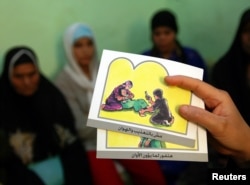More than half a million women and girls in the United States live at risk of female genital mutilation, a threefold increase in recent years because of the rise in immigrants from countries where it is practiced, a government study said Thursday.
The number of U.S. women and girls who have undergone the actual procedure is unknown, however, because of a lack of reliable data, said the study by the U.S. Centers for Disease Control and Prevention (CDC).
The report said the estimated 513,000 women and girls at risk were born or have a parent who was born in a nation where female cutting is a tradition.
Female genital mutilation remains traditional in many African countries, as well as in South Asia and the Middle East, and the World Health Organization (WHO) has estimated as many as 140 million women have been subjected to the practice.
The practice, which involves removal of the external genitalia, has been illegal for 20 years in the United States.
"This shows it's not just something that happens 'over there' but it's something that happens in this country," said Shelby Quast, Americas director for Equality Now, a global group that works to end female genital mutilation and cutting (FGM/C).
"These girls are as American as any other girls, yet they're facing something very, very life-altering," she said.
Ancient ritual can be fatal
The risk has grown fourfold for U.S. girls younger than 18, said the CDC study.
The ancient ritual, often shrouded in secrecy and widely condemned as a serious violation of women's rights, causes many health problems that can be fatal.
The study said women and girls with family rooted in Egypt, Ethiopia and Somalia were most commonly found at risk in the United States.
"The increase resulted from the fact that the U.S. population originating from FGM/C countries has risen sharply in recent decades," said the study, published online in the March/April edition of Public Health Reports.
The 513,000 women and girls at risk in 2012, the most recent year data were available, more than tripled from the 168,000 at risk in the last CDC count in 1990, it said.
Some immigrants send their daughters back to their home countries in what is called "vacation cutting," which also is illegal under U.S. law, the study noted.
The CDC count boosts public awareness and supports stronger law enforcement, Quast said, adding that many health care workers and teachers are unaware of the law and should be trained for dealing with survivors or girls at risk.






